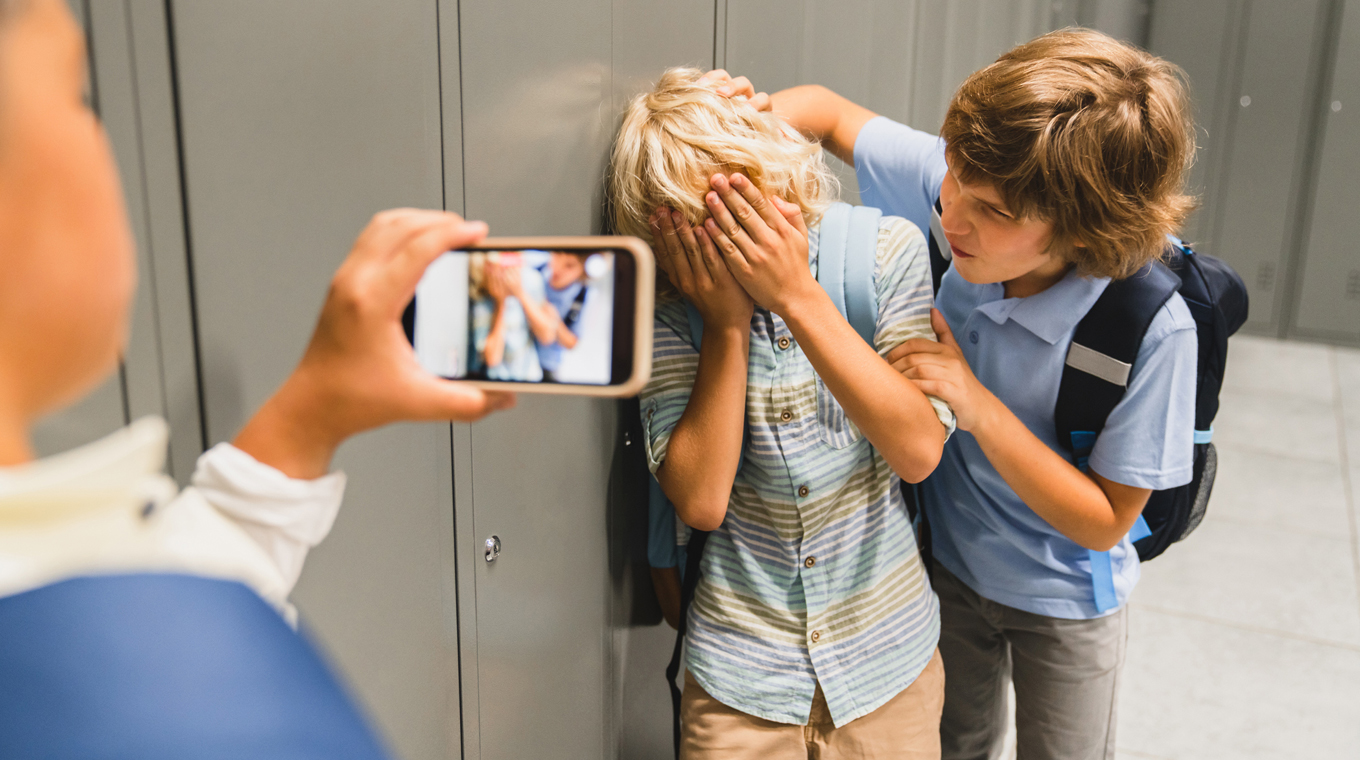
In this article
Children who are bullied sometimes feel shamed or intimidated and may suffer in silence for a long time before the adults in their lives know what’s happening. Those who become bullies may be modeling the behavior they experience at home or struggling with stress or anxiety. And between the two extremes, there are myriad reasons and situations in which bullying occurs.
While every state has anti-bullying laws in place, bullying statistics in 2022 indicate that 73% of people feel as though they were bullied at some point in their lives. Some caregivers even inadvertently teach bullying behavior through their own actions. So, how do you talk to your child about bullying, whether they’re the ones targeting other children or they’re on the receiving end of it?
Why do people bully?

There are a variety of reasons both adults and children exhibit bullying behavior. Some children may not realize that picking on someone is wrong, while others bully because doing so makes them feel better and more in control. Insecurities are often a significant driving force behind bullying. Bullying becomes a coping mechanism for pain, hurt, anger, frustration, and other emotions they’re unable to worth through in a healthy manner.
How to deal with bullying at school

Teaching kids to stand up for themselves when someone is making them uncomfortable, overstepping boundaries, or just simply being mean to them, is the first step toward making your child less of a target for a bully. Bullies gravitate toward those they consider vulnerable.
Talk to your kids and get to know their friends. Learn about what’s going on in school, who they sit with at lunch, and what they do during recess. While the day-to-day middle school drama may not be what you want to talk about at dinner, those nightly conversations can give you valuable insight into the dynamics of your child’s friend groups.
Discuss with your kids what they should do if someone else is on the receiving end of a bully’s taunting. Encourage them to sit with kids who may be excluded at lunchtime. Suggest they include those who are often excluded. And of course, make sure they know to tell an administrator when bullying occurs.
When your child is the bully
If you find out that your child is the bully, try to determine the root cause of the behavior. Is there something going on that’s upsetting them or stressing them out? Are they going through a difficult time? Has your child been feeling anxious, insecure, or frustrated about something they feel they have no control over? In many cases, bullying behavior manifests due to a lack of healthy coping skills.
When Crystal Paine discovered her child was the school bully, she was shocked. She was sure she and her husband modeled good behavior, so they couldn’t have been the ones to teach bullying behavior to their children, could they? Family therapy, however, did wonders for their situation. The aha moment came when the therapist suggested they stop trying to fix the problem but rather work on understanding their child’s perspective.
“That hit me right between the eyes and really made me go back and examine the way I was parenting. I realized I was spending so much time correcting and very, very little time connecting with my kids,” the author and mom of three explained on daytime talk show, The Doctors.
How not to be a bully to your child

We all experience frustration from time to time, and it’s easy — with the stressors of work, day-to-day life, and managing a home and family — to lose our cool every once in a while. However, most of us recognize this, make the effort to apologize to those we’ve hurt, and vow to do better next time.
Unfortunately, there are times when parents are the original bullies in our children’s lives. Name-calling, continuous criticism, and flying off the handle over insignificant things can take their toll on anyone, especially children. And, this behavior modeled at home, often creates bullies in the schoolyard.
“It’s important for parents to think about how their behaviors might influence their kids — the way they speak to their children, the way they speak to their spouses, the way they handle anger — and to be realistic about whether or not this might be something that’s been modeled for the child,” clinical psychologist Kristin Carothers told Child Mind Institute.
Talk to your child about bullying, and see if you recognize areas where you could improve your own interactions within your family. Family counseling can be helpful in teaching coping strategies and effective communication skills that will carry over into your child’s interactions at school.
In the meantime, if you notice that you’re being aggressive toward your child or with others within the family, know that your child will pick up on that. Use positive reinforcement with your child rather than negative discipline.
Teach your child to see the positive in other people and let them know that you too are working through your emotions and frustrations and trying to model good behavior toward others. Openness and honesty will go a long way in helping your child recognize the proper way to interact with others.
None of us are perfect. But by keeping the lines of communication open with our children, providing resources and insight to help them cope with their emotions, and looking out for signs of stress and anxiety or situations where our child may be being bullied, we’ll be better able to recognize issues and intervene when necessary.




